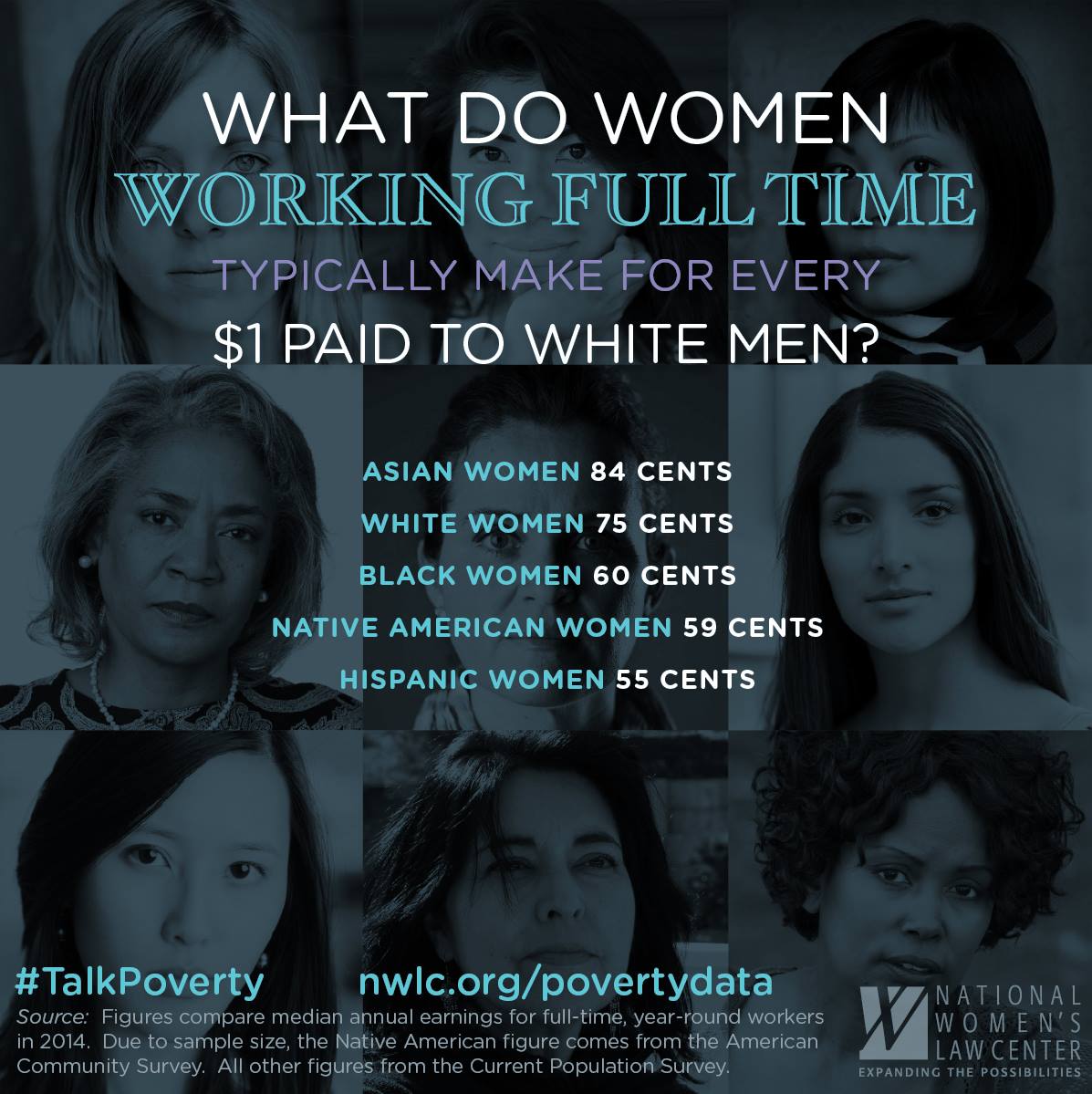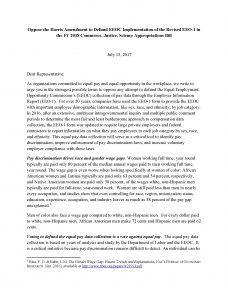
 Oppose the Harris Amendment to Defund EEOC Implementation of the Revised EEO-1 in the FY 2018 Commerce, Justice, Science Appropriations Bill
Oppose the Harris Amendment to Defund EEOC Implementation of the Revised EEO-1 in the FY 2018 Commerce, Justice, Science Appropriations Bill
July 13, 2017
Dear Representative:
As organizations committed to equal pay and equal opportunity in the workplace, we write to urge you in the strongest possible terms to oppose any attempt to defund the Equal Employment Opportunity Commission’s (EEOC) collection of pay data through the Employer Information Report (EEO-1). For over 50 years, companies have used the EEO-1 form to provide the EEOC with important employee demographic information, like sex, race, and ethnicity, by job category. In 2016, after an extensive, multiyear intragovernmental inquiry and multiple public comment periods to determine the most fair and least burdensome approach to compensation data collection, the EEO-1 form was updated to require large private employers and federal contractors to report information on what they pay employees in each job category by sex, race, and ethnicity. This equal pay data collection will serve as a critical tool to identify pay discrimination, improve enforcement of pay discrimination laws, and increase voluntary employer compliance with those laws.
Pay discrimination drives race and gender wage gaps. Women working full time, year round typically are paid only 80 percent of the median annual wages paid to men working full time, year round. The wage gap is even worse when looking specifically at women of color: African American women and Latinas typically are paid only 63 percent and 54 percent, respectively, and Native American women are paid only 58 percent, of the wages white, non-Hispanic men typically are paid for full-time, year-round work. Women are still paid less than men in nearly every occupation, and studies show that even controlling for race, region, unionization status, education, experience, occupation, and industry leaves as much as 38 percent of the pay gap unexplained.
Men of color also face a wage gap compared to white, non-Hispanic men. For every dollar paid to white, non-Hispanic men, African American men make 72 cents and Hispanic men are paid 62 cents.
Voting to defund the equal pay data collection is a vote against equal pay. The equal pay data collection is based on years of analysis and study by the Department of Labor and the EEOC. It is a critical initiative because pay discrimination remains difficult to detect. An individual can be paid less than a counterpart doing the same job for many years without knowing it, as pay is often cloaked in secrecy; indeed, according to the best available data, about 60 percent of workers in the private sector are either contractually forbidden or strongly discouraged from discussing their pay with their colleagues. As a result, discriminatory pay decisions will often not be obvious to an affected employee, making them difficult for individuals to challenge. That is why we need strong enforcement of pay discrimination laws by federal agencies and why employers must be incentivized to examine their own pay practices and take action to close any race or gender pay gaps that aren’t justified by legitimate factors like differences in qualifications.
The equal pay data collection will help promote this employer self-evaluation and correction and strong enforcement of pay discrimination laws. The reporting will ensure that employers are collecting pay data by race, ethnicity and gender, and provide an opportunity and strong incentive for employers to proactively self-evaluate their pay practices and not only correct unjustified pay disparities, but prevent them from occurring in the first place. And collecting this pay data will provide a flag for closer examination of those employers that appear to have racial or gender pay gaps that differ significantly from the pay patterns from other employers in their industry and region. By comparing wage data for firms employing workers in the same job categories, in the same industry, in the same location, in the same year, the EEOC will have important new data to determine which employers’ pay practices bear further examination and can allocate its investigative resources more efficiently and effectively as a result.
The equal pay data collection will not only strengthen enforcement of equal pay laws, it minimizes the burden for employers, and avoids duplication of effort or wasted costs. Employers have long been required to report race and gender data for their employees by job category through the EEO-1 and thus are familiar with the form, the job categories and reporting system. Moreover, federal law already requires employers to maintain and generate the information in W-2 forms that will be required under the proposal, and this information is readily available to most employers in their payroll software systems. In most instances, the systems tracking pay information and employee demographic information will be able to be linked through a one-time redesign and reprogram of the sort that is routine for computerized payroll systems, which frequently are updated to address changes in reporting requirements.
Women and people of color cannot afford to keep waiting for change; nor can the families depending on their earnings. The equal pay data collection promises to make a real difference in closing the race and gender pay gaps that have shortchanged too many for far too long. Please reject any efforts to stop this progress in its tracks.
Sincerely,
American Association of University Women (AAUW)
American Civil Liberties Union
A Better Balance
Center for American Progress
Equal Pay Today
Equal Rights Advocates
Gender Justice
Labor Council for Latin American Advancement (LCLAA)
Lawyers’ Committee for Civil Rights Under Law
The Leadership Conference on Civil and Human Rights
NAACP
National Partnership for Women & Families
National Women’s Law Center
Women Employed
